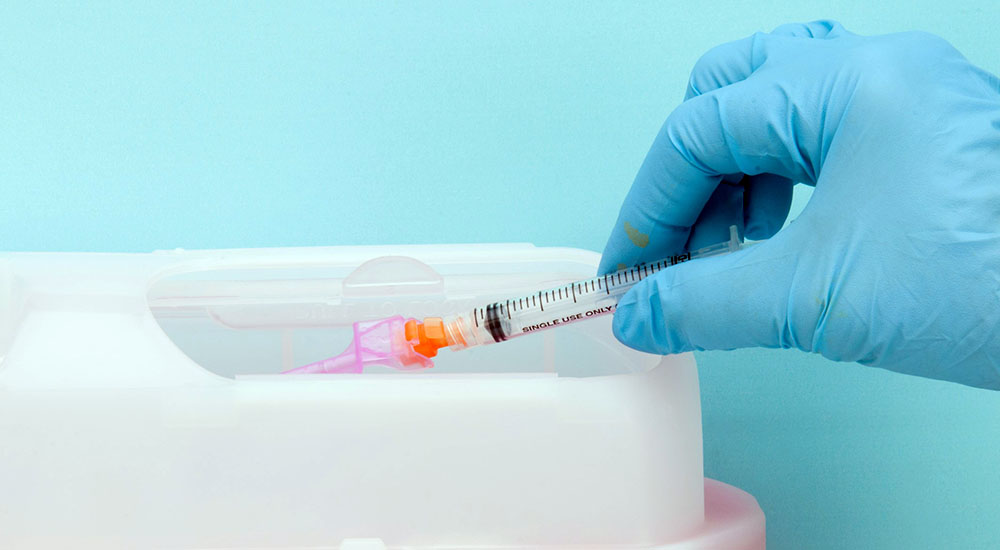Syringe Services Programs (SSPs) are historically community-based harm reduction programs. They provide preventive and treatment services, including providing sterile syringes to people who inject drugs.
VA can provide Veterans using SSPs with substance use treatment and mental health services. SSPs can also provide preventative services like vaccinations, naloxone to prevent overdose, and Pre-Exposure Prophylaxis (PrEP), a medication that prevents HIV.
SSPs were introduced in the 1980s to reduce human immunodeficiency virus (HIV) transmission among people who inject drugs. It has since become an internationally recognized harm reduction practice standard.
Help Veterans get sterile supplies they need
VA is recommending that medical centers either develop VA SSPs locally and/or refer Veterans to community partners for these services. These critical services will help Veterans get the sterile supplies they need to prevent infections like HIV, viral hepatitis, and endocarditis.
In some areas, however, state, county or local law may restrict syringe services.
If you inject drugs, talk to your VA provider about safer injection practices, including accessing sterile syringes.
There has been a rise in drug overdoses in the United States and involvement of illicitly manufactured fentanyl (potent opioid) in many deaths.
Ask your VA provider about naloxone. It is a lifesaving medication that can reverse an opioid overdose. It’s available free to VA patients who use or inject drugs.
VA also offers substance use treatment (VA treatment locator).
Keeping you safe and healthy
Your health is important to us. Your health care team can help connect you with information and resources you might need to keep yourself safe and as healthy as possible.
Learn more about SSPs at https://www.cdc.gov/ssp/index.html, and VA Substance Use Treatment and overdose prevention: https://www.mentalhealth.va.gov/substance-use/index.asp.
Syringe Services are a key component of the Federal Initiative: Ending the HIV Epidemic: A Plan for America.
Learn more about VA’s efforts to end HIV in this short video.
Elizabeth Maguire is the communications lead for the HIV, Hepatitis, and Related Conditions Program Office.
Topics in this story
More Stories
Watch the Under Secretary for Health and a panel of experts discuss VA Health Connect tele-emergency care.
The 2024 National Veteran Suicide Prevention Annual Report provides the foundation for VA’s suicide prevention programs and initiatives.
Theranostics is a specialized field of nuclear medicine that uses a two-pronged approach to diagnose and treat cancer.








Why is the VA supporting illegal drug use? Especially when it had to drastically reduce providing veterans with mega pain meds, ie, opiates, AFTER getting them hooked on them? You can’t have it both ways, so chose a direction and quit crying about the other one.
[Editor: There are many medications that are also self-administered by injection.]
The VA isn’t supporting illegal drug use, they are preventing the spread of HIV and other blood borne pathogens as well as overdose prevention. Capitol Area Reentry Program, Inc has been providing Clean Syringe Access since 2005 in Baton Rouge, LA. We have been serving active duty and veterans that inject drugs since our beginning. The majority of our veteran program participants didn’t start with pain medication, they started while overseas during in this war. This isn’t the first Heroin crises this country has experienced, during and post Viet Nam, 10s of thousands of American soldiers were returning home addicted to heroin. What is believed to be the first Needle Exchange program in 1988 was started by David Purchase who told me he was tired of seeing his biker and army buddies acquiring HIV and dying from AIDS related illness’. “AFTER” people were prescribed opiates for pain for injuries they sustained while defending our country the VA patients developed a dependency, you say “you can’t have it both ways, so chose a direction and quit crying about the other one”. They did make a choice, they are making a choice to reduce the harm associated with injection drug use, prevent the spread of blood borne pathogens, prevent overdoses, linking veterans to treatment services and assist in behavioral change. Clean syringe access should be seen as an outreach and a prevention tool and not “supporting illegal drug use”. If you don’t access PWIDs then how can providers affect change? By providing veterans access to clean syringes the VA is sending the message, “we are willing to meet you were you are, we care about your safety and we value as a human being”. This becomes the first step towards change.